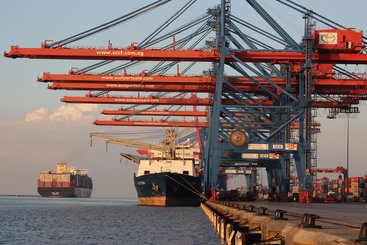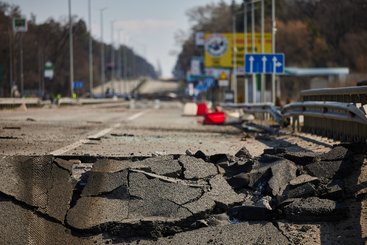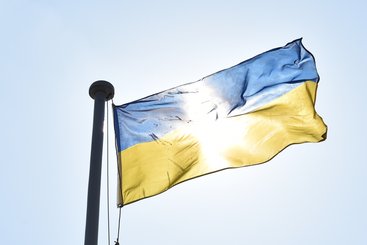What if Russia won the Ukraine war? Not by lack of Ukraine’s will to fight but because, faced with insufficient financial and military support from its allies to secure a decisive victory, the country had no real choice but to accept a concessional peace deal? Will this bring peace to Europe? And what other risks would this create?
As the full-scale Russia-Ukraine war goes into its third year and the EU gears up for parliamentary elections in June, these are the questions all European politicians must be honest about with their electorates.
The EU and member states have jointly committed €144bn since the invasion, but the US has been Ukraine’s largest bilateral backer with over €70bn. This assistance has paid to support Ukraine on the battlefield, provide public services and humanitarian assistance.
However, in the US an assistance package that would deliver crucial military aid to Ukraine has stalled. While the Senate has passed the bill, it must get through the House before it can become law. Even if the package is approved, long-term US support for Ukraine is not guaranteed, especially in the case of a second Trump presidency. Europe urgently needs to plan for such a scenario, particularly as Russia’s economy is on a wartime footing able sustain the conflict well beyond 2024.
The EU’s recent €50bn commitment is critical to supporting the Ukrainian state, as is continued bilateral support from member states. But more European financing and military assistance will be critical if US support ceases as Ukraine would likely run out of resources to sustain military action and be forced into signing a concessional peace deal – likely with large territorial losses and other concessions that undermine its sovereignty.
With the European elections potentially bringing more Ukraine sceptics to the Parliament, securing further assistance for Ukraine will become more difficult. Despite the costs, Europeans must be honest about the risks of a concessional peace deal that would be unlikely to bring a lasting peace to Ukraine, or Europe.
Ukrainians know that a concessional deal that cedes territory will not bring peace to what will remain of the country or allow it to prosper – that’s why many would refuse to accept it. Russia will only come to the negotiating table when President Putin feels that the country has occupied as much Ukrainian territory as possible – which means further territorial gains – so that he can sell the peace deal as a palatable win to his military and political elites and people.
Ukrainians’ experiences since 2014 mean they know that such a peace deal won’t hold. Their trust in allies would also dissipate given that Europe failed to decisively punish Russia for its actions in 2014 and any security guarantees will seem hollow.
In the case of a concessional peace, more Ukrainians will flee affected regions, with some relocating internally and others leaving the country and joining the 6.5mn Ukrainians who have already fled. Many will choose not to return. Ukrainians will likely have varying degrees of success in integrating across Europe and may also add to simmering resentment across the continent over migration.
Some Ukrainians may refuse to accept territorial losses and continue partisan warfare to regain lost territories – meaning that a conflict on Europe’s borders will continue. Partisan warfare will create demand for illicit flows of weapons and other commodities. Instead of putting resources towards recovery and reconstruction – now estimated at some €440 billion – the Ukrainian government may need to focus on reigning in partisan action. Ukraine’s stretched governance capacity will have fewer resources to oversee reconstruction. Its fragility will create cascading risks across Europe, exacerbating political and security challenges.
Any concessional peace deal will also formalise and expand Russia’s control over Ukraine’s resources – agricultural, critical minerals and energy to name a few. The EU has looked to Ukraine as a strategic partner as it diversifies critical mineral supply chains away from reliance on China. Russia would likely control many of Ukraine’s mineral reserves, which include lithium and rare earths minerals, as well as hydrocarbons reserves and a significant proportion of the country’s agricultural lands.
Not only would both the EU and Ukraine miss out on economic opportunities in developing those resources, but Russia would increase its influence in global commodity markets – which it has proved willing to weaponise to achieve its foreign policy aims – just as the EU accelerates its race to green transition while de-risking supply chains.
An emboldened Russia that wins a concessional peace deal will continue posing a security threat to Europe. It will continue trying to undermine the EU from within and exacerbate external pressures through hybrid actions. These may take different forms – from disruption of critical infrastructure to amplifying disinformation to sow political and social discord.
It’s been two years since the full-scale invasion and as the war grinds on costs continue to mount. No doubt there will be opposition in Europe to providing more funds. But if further US assistance fails to come through, or the country withdraws its support, Europe would do well to be honest about the risks of letting Russia win a concessional peace.



